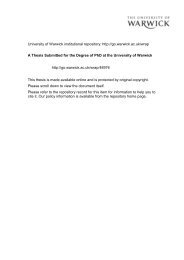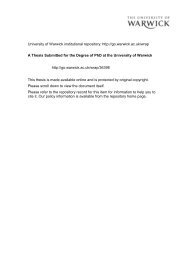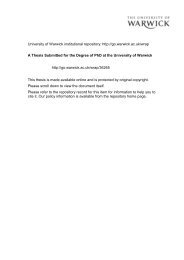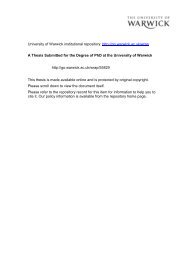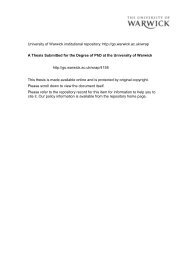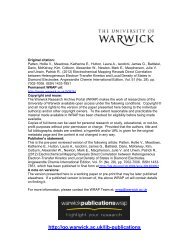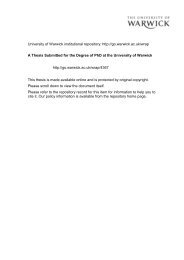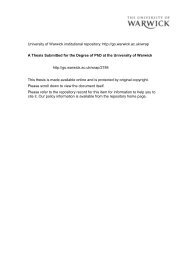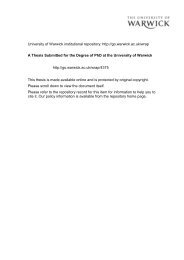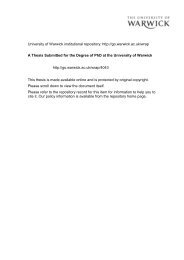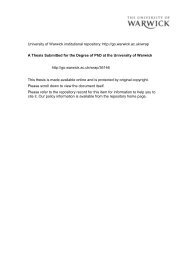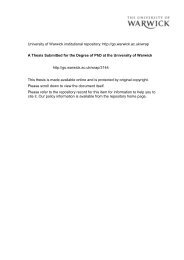Download (13Mb) - WRAP: Warwick Research Archive Portal ...
Download (13Mb) - WRAP: Warwick Research Archive Portal ...
Download (13Mb) - WRAP: Warwick Research Archive Portal ...
Create successful ePaper yourself
Turn your PDF publications into a flip-book with our unique Google optimized e-Paper software.
casa sul lago della luna (1984) shares a clearly decipherable set of predominantly<br />
male authorial influences and intertextual references.l" an obviously autobiographical<br />
input and a hero dedicated to artistic ideals with a love of enclosed spaces. However<br />
Duranti has never shied away from analysing the differences imposed by the gender<br />
system," and this gives each ofthese features a distinctly new tone. Duranti learns to<br />
meet the male text half way, admitting her own dependency on it, without being blind<br />
to its potentially imprisoning effect. She shows how the power of fantasy can make<br />
enclosure the only option, but by setting the tale against the crossing of real national<br />
boundaries shows that other alternatives exist.<br />
For a while Duranti's suspicion of the enclosed realm of the male-authored<br />
fantastic and male textual construction in general means that she keeps it at this<br />
distance - always experienced by a male protagonist. However, as her confidence<br />
increases, in Sogni mancini (1996) she produces a more innovative use of the<br />
fantastic. She uncovers its potential for multiple spaces of fantasy, which shatter its<br />
imprisoning power and make it a modality oftransformation in the (de)construction of<br />
female subjectivity. In this female subject we see the first of several for whom taking<br />
up the active role in a quest motif demystifies the enclosed space, without draining it<br />
of all its symbolic power as creative and protective space. Duranti's novel suggests<br />
that the female subject can also develop an art ofliving."<br />
By looking at this fantastic manifestation of the 'nomadic subject' we gain a<br />
new insight into Rosi Braidotti's ideal ofpostmodern feminist subjectivity as situated<br />
(locally), yet free, able to settle anywhere, but never with permanence in mind. 47 The<br />
relevance of Braidotti's philosophy to contemporary Italian women writers who have<br />
a particular tendency towards the regional/international has been observed on more<br />
than one occasion.f The fantastic allows a similar subjecthood to find itself new<br />
44 See Donatella De Ferra's thorough analysis of the intertextuality of the novel in her introduction to<br />
La casa sui lago della luna, ed. and introduced by Donatella De Ferra (Hull: Troubador, 2001).<br />
45 This does not extend to her acceptance ofthe title woman writer.<br />
46 Susan. J. Rosowski, 'The Novel of Awakening' in Abel, Elizabeth, Hirsch, Marianne and Langland,<br />
Elizabeth (eds), The Voyage In: Fictions of Female Self-Development (Hanover, NH, London:<br />
University Press of New England): 'The direction of awakening follows what is becoming a pattern in<br />
literature by and about women: movement is inward, towards greater self-knowledge that leads in turn<br />
to a revelation of the disparity between that self-knowledge and the nature of the world. The<br />
protagonist's growth results typically not with an "art of living", as for her male counterpart, but<br />
instead with a realization that for a woman such an art of living is difficult or impossible; it is an<br />
awakening to limitations.' (p.49)<br />
47 See Rosi Braidotti, Nomadic Subjects: Embodiment and Sexual Difference in Contemporary<br />
Feminist Theory (New York: Columbia University Press, 1994).<br />
48 See Adalgisa Giorgio, 'Moving across Boundaries: Identity and Difference in the work of Fabrizia<br />
17




